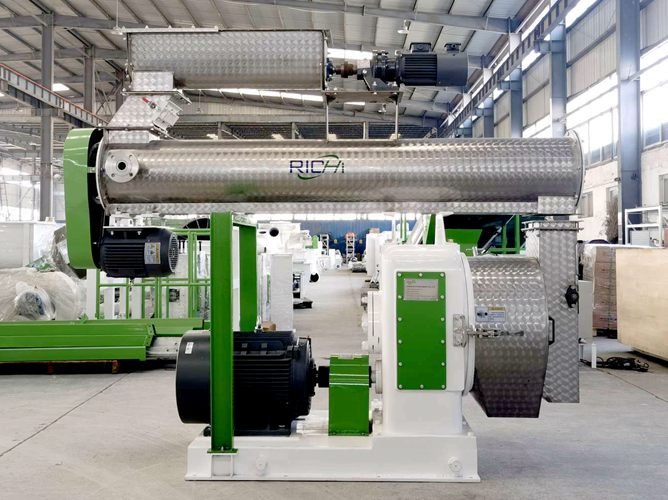Maintenance and Safety Guidelines for Poultry Feed Mill Machine
Poultry feed mill machines play a crucial role in the production of high-quality feed for poultry. These machines are designed to grind and mix various ingredients to create nutritious feed that meets the specific dietary needs of different poultry species.
However, to ensure optimal performance and longevity of these machines, regular maintenance and adherence to safety guidelines are essential.

Introduction to Poultry Feed Mill Machine
Poultry feed mill machines are sophisticated pieces of equipment that require careful handling and maintenance. These machines consist of various components, such as a grinding chamber, mixing chamber, hammers, screens, and electrical controls.
They are designed to process and mix different types of feed ingredients, including grains, proteins, vitamins, and minerals, to create a balanced diet for poultry.
Importance of Regular Maintenance and Safety Measures
Regular maintenance of the poultry feed mill machine is crucial to ensure their smooth operation and prevent breakdowns. By following maintenance guidelines, operators can identify and address potential issues before they escalate, reducing downtime and costly repairs.
Furthermore, adherence to safety measures is essential to protect operators from accidents and ensure a safe working environment.
Understanding the Components of Feed Mill Machines
To perform proper maintenance, it is important to have a good understanding of the different components of poultry feed mill machines.
The grinding chamber is responsible for pulverizing ingredients, while the mixing chamber blends the ground materials. Hammers and screens are vital for the grinding process, and electrical controls regulate the machine’s operation.
Proper Lubrication Techniques for Optimal Performance
Lubrication is a critical aspect of maintaining feed mill machines. Proper lubrication ensures smooth operation, reduces friction, and prevents premature wear and tear of components.
Related post: https://richipelletizer.com/poultry-feed-mill-machine/
It is essential to use the recommended lubricants and follow the manufacturer’s guidelines for lubrication intervals. Regular lubrication of bearings, rollers, and other moving parts is essential to extend the machine’s lifespan.
Preventive Maintenance Schedule for Poultry Feed Mill Machines
To minimize the risk of breakdowns and ensure continuous operation, a preventive maintenance schedule should be implemented. This schedule should include regular inspections, cleaning, lubrication, and replacement of worn-out parts.
By proactively addressing maintenance needs, operators can avoid unexpected downtime and reduce the chances of major repairs.
Common Troubleshooting Techniques for Feed Mill Machines
Despite regular maintenance, feed mill machines may encounter issues from time to time. Understanding common troubleshooting techniques can help operators identify and resolve problems efficiently.
These techniques may include checking for blockages, adjusting screen sizes, inspecting electrical connections, and replacing worn-out or damaged parts.
Safety Guidelines for Safe Operation of Feed Mill Machines
Safety should be a top priority when operating the pellet maker. Operators should receive proper training on the safe operation of these machines.
Safety guidelines may include wearing appropriate protective gear, such as gloves and safety glasses, ensuring a clear workspace, and using lockout/tagout procedures when performing maintenance or repairs.
Proper Cleaning and Sanitization Procedures for Hygiene
Maintaining proper hygiene in feed mill machines is crucial to prevent contamination and ensure the production of safe and high-quality feed. Operators should follow specific cleaning and sanitization procedures recommended by the machine’s manufacturer.
These procedures may involve disassembling the machine, removing residue, and using approved sanitizers to eliminate bacteria and pathogens.
Ensuring Electrical Safety in Poultry Feed Mill Operations
Given the reliance on electrical controls in feed mill machines, ensuring electrical safety is of utmost importance. Operators should be trained to handle electrical components safely and be aware of potential hazards, such as exposed wires or faulty connections.
Regular inspection of electrical systems, grounding, and adherence to safety protocols can prevent electrical accidents.
Training and Certification for Feed Mill Machine Operators
To ensure safe and efficient operation of feed mill machines, operators should receive adequate training and certification. Training programs should cover machine operation, maintenance procedures, troubleshooting techniques, and safety guidelines.
Certification programs can validate an operator’s competence and ensure that they are equipped with the necessary skills to operate the machines effectively.
Proper maintenance and adherence to safety guidelines are essential for the optimal performance and longevity of poultry feed mill machines. By understanding the components, implementing regular maintenance schedules, troubleshooting problems, and following safety measures, operators can ensure the safe operation of these machines. Additionally, proper cleaning, electrical safety, and operator training further contribute to the overall efficiency and productivity of poultry feed mill operations.
